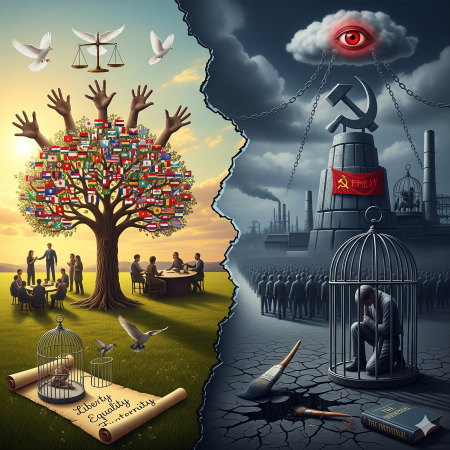Which system has better adapted to modern global challenges like climate change, inequality, and digital surveillance?

Comparing the two systems' abilities to adapt to modern global challenges reveals a complex picture, with each system having distinct strengths and weaknesses.
Overall, democratic systems, particularly those with strong social programs, have demonstrated a greater capacity for self-correction and adaptation, though they are often slower to act.
Authoritarian or communist systems can act swiftly, but their top-down approach often lacks the flexibility and public buy-in needed for long-term, sustainable solutions.
Climate Change
-
Democracies: The democratic process can be slow and contentious due to the need for public consensus and political compromise. However, this also means that when climate policies are passed, they tend to have greater public support and legitimacy, making them more durable. The inclusion of diverse voices—from scientists and activists to businesses and local communities—can lead to more holistic and innovative solutions. Examples include carbon taxes, green energy subsidies, and international agreements like the Paris Accord, all of which are debated and enacted through legislative processes.
-
Communist/Authoritarian Systems: These systems can implement large-scale, top-down policies with great speed. For example, China has become a world leader in renewable energy production and has set ambitious carbon neutrality goals. However, this is often done without public input and can come at a high social cost, such as the forced displacement of communities for the construction of dams or solar farms. The lack of transparency can also obscure the true environmental impact of a country's policies.
Inequality
-
Democracies: While democracy doesn't inherently solve inequality, it provides the mechanisms to address it. Citizens can vote for policies that promote redistribution, such as progressive taxation, social welfare programs, and minimum wage laws. The hybrid systems mentioned earlier, like social democracies, are prime examples of this. However, democratic systems are also susceptible to the influence of wealthy special interests, which can block or weaken policies aimed at reducing inequality.
-
Communist/Authoritarian Systems: Historically, communist states have struggled with the ideal of a classless society. While initial policies may have reduced certain forms of inequality, new hierarchies and inequalities often emerged, driven by political power and access to state-controlled resources. For example, Soviet-era leaders and party members often enjoyed privileges unavailable to the general population. In modern China, the embrace of a market economy has led to a massive increase in wealth inequality, with a small number of elites benefiting disproportionately.
Digital Surveillance
-
Democracies: Democratic nations face a constant tension between security and privacy. While they use digital surveillance for law enforcement and intelligence, it is often subject to legal oversight, public debate, and challenges by civil liberties groups. Laws are enacted to protect data privacy, and citizens have the right to protest and demand accountability from their governments. However, as the digital age progresses, there is a risk of this oversight being eroded, and the line between protecting national security and infringing on privacy can become blurred.
-
Communist/Authoritarian Systems: These systems are inherently more inclined to use digital surveillance as a tool for political control. China's "social credit system," for example, uses a massive network of surveillance cameras, facial recognition, and data collection to monitor and rank its citizens' behavior. This creates a system of pervasive social and political control, with little to no legal recourse or public accountability. The goal is often not just to catch criminals, but to enforce political conformity and suppress dissent.
Conclusion
In sum, democratic systems are better adapted to these challenges in a way that respects fundamental human rights and liberties. While they may be slow and messy, they have a built-in capacity for course correction through elections, free press, and an independent judiciary. This allows them to debate, reform, and adapt their policies over time. Authoritarian systems, by contrast, can be faster and more decisive in the short term, but their reliance on top-down control and lack of accountability makes them prone to making big mistakes without the means to easily correct them. They also often solve one problem (e.g., rapid infrastructure development) by exacerbating another (e.g., the erosion of individual freedom and privacy).
- Questions and Answers
- Opinion
- Motivational and Inspiring Story
- Technology
- Live and Let live
- Focus
- Geopolitics
- Military-Arms/Equipment
- Seguridad
- Economy
- Beasts of Nations
- Machine Tools-The “Mother Industry”
- Art
- Causes
- Crafts
- Dance
- Drinks
- Film/Movie
- Fitness
- Food
- Juegos
- Gardening
- Health
- Home
- Literature
- Music
- Networking
- Other
- Party
- Religion
- Shopping
- Sports
- Theater
- Health and Wellness
- News
- Culture

